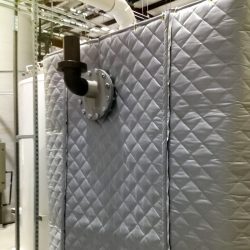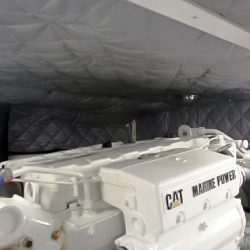Tennessee Gas
The Issue
The noise from compressors at Tennessee Gas station 254 was more than a concern for employees. It was also causing serious problems for with their next-door neighbor and subsequently Nassau’s town fathers. Plans were already in the works for expansion. Tennessee Gas decided to investigate a remedy to the noise problem.
The Challenge
It’s hard to imagine that one person could hold up the expansion plans of a $3 billion corporation. But that’s exactly what happened to the Tennessee Gas division of Tenneco.
This Tennessee Gas pipeline compressor station 254 is in the small town of Nassau, New York. The station houses five 1400 horsepower compressors. These compressors make it possible for natural gas to flow to thousands of homes throughout New York and New England.
The compressors were causing serious problems for Tennessee Gas. Compressor station 254 sits on a 40-acre lot bordered on one side by a private residence. The homeowner’s complaints to the local government and press created an adverse public relations climate for Tennessee Gas. With major expansion planned, Tennessee Gas chose to take action.
Independent testing showed that compressor station 254 was generating sound levels up to 60 dB(A) at the boundary line. Further testing revealed that the dominant noise sources were low frequency, which are always more difficult to attenuate than high frequency noise. To comply with local and state ordinances and clear the way for future expansion, Tennessee Gas set out to find a company that could reduce the noise level at the property line from 60 dB(A) to 50 dB(A) by treating the building, rather than individual compressors. Their reasoning was that employees must have unrestricted access to the compressors and clear visibility throughout the building.
The Solution
After considering and quickly dismissing a foam product because of its expense and inability to meet the Class 1 Fire Rating, Tennessee Gas searched for an acoustical solution. It was recommended to line the walls and ceiling with a sound absorption /barrier composite, they decided on the PrivacyShield® Dual-Sided Absorptive Soundproofing Blanket. The blanket, made up of quilted fiberglass and a 1 lb./sq. ft barrier, would do double duty for Tennessee Gas by absorbing airborne sound waves and increasing the transmission loss ability of the building. Using a Velcro® attached noise barrier batten would prevent leaks at the seams of the panels.
After testing and the development of a new time and money-saving installation technique, more than 800 panels were made to line the interior of the 40′ x 179′ x 28′ high building.
The Result
Post-installation testing showed that the PrivacyShield® Dual-Sided Absorptive Soundproofing Blanket performed better than promised. The noise level at the property line was reduced from 60dB(A) to 45dB(A). 5dB(A) lower than what was specified. And while noise levels within the building were not as critical, Tennessee Gas officials were pleased the employees could now hold a conversation without shouting. In addition, Tennessee Gas found that the light-colored fabric facing used dramatically improved the lighting inside the building.
Town officials quickly expressed their pleasure with the decrease in noise. And the neighbor who shares the property line called Tennessee Gas Pipeline officials to thank them. He even said he would alert the local media to encourage a positive article on the company and Tennessee Gas Pipeline officials are confident they will not hear a lot of noise from the local government when they move ahead with expansion plans.
To learn more about how Acoustical Solutions can solve your noise control problems, use our contact form, call one of our Acoustical Sales Consultants at (800) 782-5742, or visit us on the web at acousticalsolutions.com.









